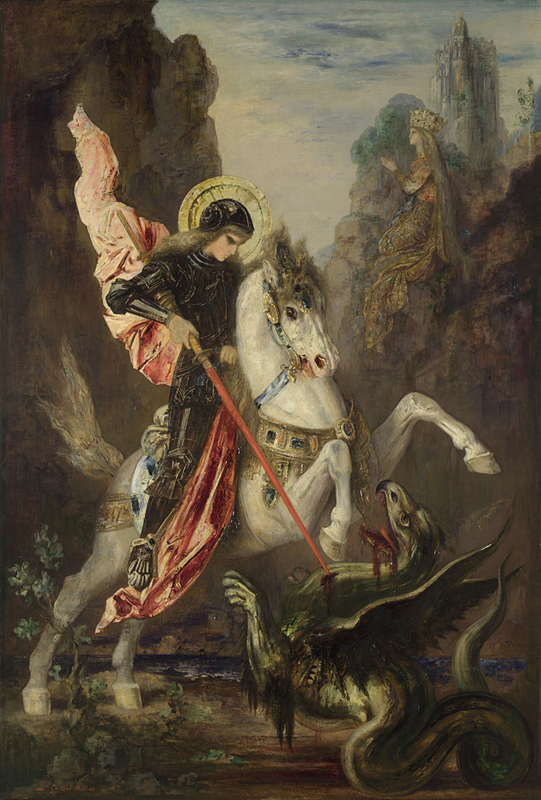Richmond Read-along: Shakespeare and St George
Today (23rd April) marks both St George’s Day and the anniversary of Shakespeare’s death. It’s also widely believed to be Shakespeare’s birthday, although we don’t know for certain what day he was born. Either way, it is the day on which we celebrate arguably the greatest and most enduring figure in English literature, along with our patron saint.
There are more theories than we could go into here about who Shakespeare was. Some believe he was a noble writing under a pseudonym; Sir Francis Bacon is a popular choice. Others believe he was another writer, or collection of writers. However, it is generally accepted that William Shakespeare was the man we recognise from the portrait emblazoned across Shakespeare anthologies, websites and theatre programmes. The son of fairly successful (but far from noble) parents, he grew up in Stratford-upon-Avon, and parish records show he was baptised on April 26th 1564. Children were baptised as soon as possible after birth due to high infant mortality rates – if you waited to baptise, the infant may die. Under the widespread Christian beliefs of the time, they would then be shut out from heaven. William grew to be the man now familiar to much of the world as England’s greatest playwright and beloved poet. Today is a perfect opportunity to celebrate his work and influence with King Henry’s speech from Henry V – which conveniently mentions St George.

Saint George and the Dragon
1889-90
Oil on canvas, 141 x 96.5 cm
Bought, 1976
NG6436
https://www.nationalgallery.org.uk/paintings/NG6436
St George is a nebulous figure. While it seems likely that he did exist in some form, it is difficult to separate the various myths and legends that surround him to pin down a single historical figure. However, there is plenty of evidence of cults dedicated to a St George, stretching back to Syria and Palestine in the early fourth to sixth centuries. The tales of St George first reached Britain via a travelling bishop coming to the Isle of Iona in Scotland, but seem to have spread into England from France and the continent. The cult of St George became popular, and during the 1300s he was officially cited as the patron saint of England. St George’s popularity has led to his historical and current veneration by a great many areas; England shares our patron saint with Catalonia and the Greek Army, and he remains popular throughout the Middle East, with Christian denominations and Muslims alike.
He is mentioned in this speech from Henry V:
“Once more unto the breach, dear friends, once more,
Or close the wall up with our English dead.
In peace there’s nothing so becomes a man
As modest stillness and humility,
But when the blast of war blows in our ears,
Then imitate the action of the tiger.
Stiffen the sinews, conjure up the blood,
Disguise fair nature with hard-favoured rage.
Then lend the eye a terrible aspect,
Let it pry through the portage of the head
Like the brass cannon, let the brow o’erwhelm it
As fearfully as doth a gallèd rock
O’erhang and jutty his confounded base,
Swilled with the wild and wasteful ocëan.
Now set the teeth and stretch the nostril wide,
Hold hard the breath, and bend up every spirit
To his full height. On, on, you noblest English,
Whose blood is fet from fathers of war-proof,
Fathers that like so many Alexanders
Have in these parts from morn till even fought,
And sheathed their swords for lack of argument.
Dishonour not your mothers; now attest
That those whom you called fathers did beget you.
Be copy now to men of grosser blood,
And teach them how to war. And you, good yeomen,
Whose limbs were made in England, show us here
The mettle of your pasture; let us swear
That you are worth your breeding—which I doubt not,
For there is none of you so mean and base
That hath not noble lustre in your eyes.
I see you stand like greyhounds in the slips,
Straining upon the start. The game’s afoot.
Follow your spirit, and upon this charge,
Cry, ‘God for Harry! England and Saint George!’ ”
You can find this speech as well as more information about Shakespeare and his works at The New Oxford Shakespeare. See also William Shakespeare: A Very Short Introduction. Read more about Saint George in his entry from the Oxford Dictionary of National Biography. All these resources are accessible online with a Richmond upon Thames library card.

Leave a Reply